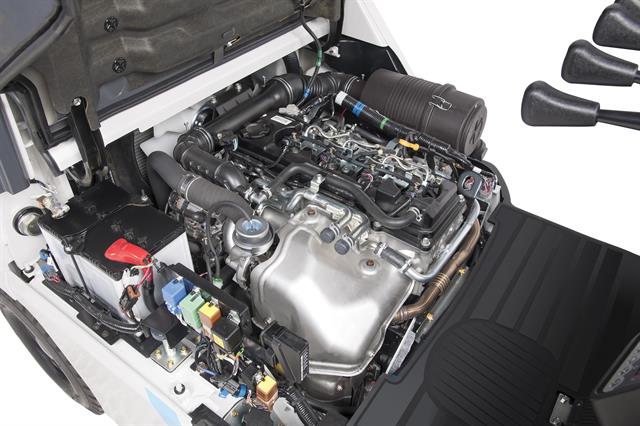A new study of forklift users by Calor found some 38% of those surveyed said they were coming under increasing pressure to reduc...
A new study of forklift users by Calor found some 38% of those surveyed said they were coming under increasing pressure to reduce carbon from their forklift fleets. That pressure will now likely rise following a landmark legal ruling over the death of a nine-year-old asthmatic London girl who is the first person in the UK, and possibly the world, to have "air pollution" listed on her death certificate as the cause of death. Such a ruling will undoubtedly galvanise insurance companies to pressure warehouse operators of diesel trucks who are already under a legal obligation to make the warehouse a safe place.
![]()
Engine makers have made significant strides
Although 54% of those surveyed recognised that carbon reduction was a very important consideration when choosing how their forklift fleet should be fuelled, they have to juggle with other operational and commercial priorities. Above carbon concerns were cost (65%), fuel efficiency (64%), machinery downtime (63%), security of supply (59%) and level of customer service from the fuel provider (57%) when it comes to fuel selection. Surprisingly, only 51% of respondents rated cleanliness as a very important issue and only 8% of those surveyed in the retail, leisure and catering industries have said that their business had been very effective in lowering its carbon emissions over the last 12 months.
The Calor report shows that there are wide regional and industry differences over fuel choice which reflect tougher technological barriers to carbon reduction. In manufacturing and utilities, for example, they felt restrained over dumping diesel because of the energy required for their processes, the limitation of electric and battery technology and the grid's current inability to satisfy demand fully at peak times.
Companies in manufacturing, utilities, retailing, catering and leisure need vehicles with enough torque to lift and shift heavier products which dissuades them from using electric trucks which they claim underperform in such circumstances. Users of outdoor fleets also find that electrics are not suitable for their needs as the damp conditions can cause issues with wiring circuitry and electrical components. Another dissuader is the view of 62% of respondents that they don't have enough charging points for their electric forklift fleets, which have to be recharged daily and left to cool for hours before use.
The great strides in electric chargers and batteries, however, have diminished these concerns, with claims by manufacturers of electric forklifts, particularly those powered by lithium-ion and iron-phosphate batteries, that recharging times are no longer a challenge and that they can equal the performance punch of diesel and LPG and perform well in outdoor conditions.
There are, of course, other forklift fuels, like LPG, which, though cleaner than diesel (no benzene), are still not squeaky clean at point of use, but they have made a big improvement to lowering carbon emissions by offering a bio LPG fuel that cuts 20-32% of carbon compared with conventional LPG.
Encouragingly, some 94% of respondents agree that more can be done to cut carbon emissions and this is one area where government help can make a big difference. Government financial incentives can change end-user behaviour.







 粤公网安备 44010602003952号
粤公网安备 44010602003952号